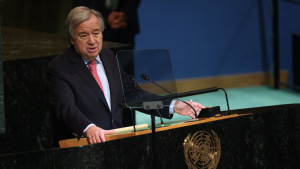The Paris Climate Agreement’s goal of 1.5 degree Celsius global temperature rise in this 21st century in order to limit the extremities of climate change “is on life support and the machines are shaking”. So says the United Nations Secretary-General António Guterres speaking exclusively to SABC News ahead of the COP27 UN Climate Summit which begins in Egypt on Monday.
Guterres has called for a historical pact between developed countries and emerging economies to put together the resources to allow for a global reduction in greenhouse gas emissions.
The UN Chief also addressed the Ethiopian Peace deal penned in South Africa and the critical Grain Deal that is up for renewal in just two weeks.
Sat down with UN Secretary General Antonio Guterres – we talked about #COP27, the Grain Deal and this clip on the Ethiopian Peace Agreement penned in South Africa.
For a preview watch @SABCFullView today from 17h00CAT and the full interview on Sunday#sabcnews pic.twitter.com/GlbMHWXpDw
— Sherwin Bryce-Pease (@sherwiebp) November 4, 2022
Guterres has been unequivocal that this climate gathering in Egypt’s resort town of Sharm el-Sheikh must be the place to close the ambition gap, the credibility gap and the solidarity gap.
“It is extremely critical. We have not much time. We are keeping the 1.5 degrees goal of increase of temperature as the maximum acceptable, on life support and the machines are shaking, as I said this morning, in an intervention. And we are getting close to a tipping point from which all, if we do not change course, the 1.5 degrees will be irreversibly impossible unless a technological miracle happens in between, which, of course, is not something we can count on,” said the Secretary-General.
UN Chief speaks exclusively to SABC News:
The implications of the 2.8 degree Celsius global temperature rise which reflects the current trajectory, are more scenes like the devastation wrought by hurricane Ian that barreled through the US State of Florida in late September; or the June monsoon floods that killed over 1700 people in Pakistan. This, as the issue of financing and technological know-how becomes a critical sticking point between developed and emerging economies.
Guterres says developing countries and emerging economies have raised objections saying developed nations for many decades been the biggest contributors to greenhouse gas emissions without challenge, but now, they [developing nations, and emerging economies] need to make provision for emission control measures while trying the develop their countries and dealing with the challenge of having to solve technological limitations.
“This blame game would lead nowhere. So, what we need now, we have, as you know, several coalitions. It was a suggestion I made in Glasgow and several countries made agreements between G7 countries, international financial institutions and the emerging economies themselves (it was true for Indonesia, Vietnam, South Africa) in order to be able to speed the transition. But that is not enough. We need to have an historical pact between developed countries and the emerging economies to be able to put together all the resources, financial and technological, to allow for a global reduction of emissions,” concluded Guterres.
The full interview will be aired on Sunday, 6 November at 18:00 on SABC News Full View show.
[WHAT TO EXPECT]
On Sunday @SABCNews Correspondent @sherwiebp will have a one-on-one conversation with @UN Secretary-General @antonioguterres ahead of the #COP27 . #SABCNews #FullView pic.twitter.com/4CPiHbqwJQ
— SABC Full View (@SABCFullView) November 4, 2022






